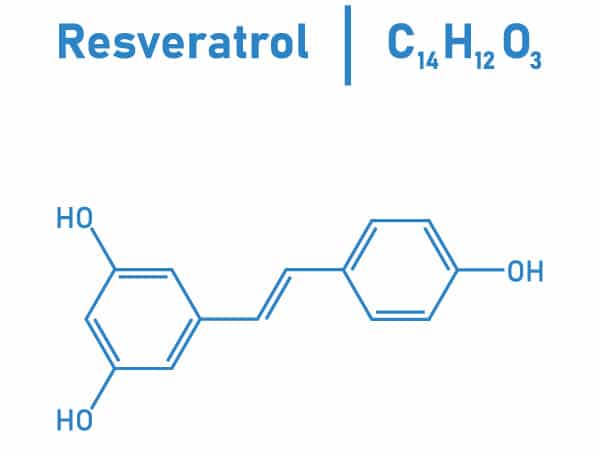What is Resveratrol?
Resveratrol is a naturally occurring polyphenol commonly found in peanuts, grapes and some berries. Benefits of using resveratrol include: enhanced mitochondrial function, protection from obesity and obesity-related diseases, suppression of inflammation, cancer cell growth and cardiovascular disease.
Resveratrol’s systemic effects are rooted in a handful of mechanisms, including direct antioxidant activity, cyclooxygenase 2 (Cox-2) inhibition, Sirt1 activation, F1-ATPase inhibition, estrogen receptor inhibition, effects on biotransformation enzymes, inhibition of proliferation and induction of apoptosis, inhibition of tumor invasion and angiogenesis, and anti-inflammatory effects.

Benefits of Resveratrol
Resveratrol has been shown to inhibit vascular cell adhesion molecule (VCAM) expression in tissue culture. VCAM is expressed on the surface of the vascular endothelium (the innermost layer of cells in blood vessels) in response to oxidative stress. The expression of these proteins on the surface of endothelial cells provides an anchoring and entry point for inflammatory white blood cells.
These cells migrate across the endothelium into the middle layer of the artery, where they can become foam cells. Foam cells make up the bulk of arterial plaque. This suggests that resveratrol supplementation may prevent or slow the onset of atherosclerosis by preventing the invasion of the artery by immune cells.
Resveratrol inhibits vascular smooth muscle cell proliferation. Hypertension increases mechanical stress on arterial walls. The body responds to this by promoting the proliferation of vascular smooth muscle cells, which line the middle layer of the artery. This can cause the artery to thicken and become less distensible, leading to chronic hypertension and its consequences. Resveratrol has been shown to inhibit the proliferation of VSMCs in tissue cultures and in the body.
Resveratrol upregulates nitric oxide synthetase. The endothelium of the artery contains an enzyme that catalyzes the production of nitric oxide (NO). NO induces relaxation of the arterial tree. Dysregulation of NO homeostasis can contribute to increased blood pressure. In cultured endothelial cells, resveratrol has been shown to stimulate endothelial nitric oxide synthetase. This suggests that resveratrol may increase nitric oxide synthesis.
Resveratrol has been shown to inhibit platelet activation and aggregation. These processes are central to clot formation, which is potentially the most dangerous risk factor in cardiovascular disease.
Resveratrol, diabetes, and obesity
More than one-third of United States adults suffer impairments in glucose metabolism. These impairments include insulin resistance, defects in insulin secretion, impaired insulin receptor signaling, inability to use fat for energy, associated disturbances in lipid profiles, and increased pro-inflammatory cytokines. Resveratrol improves insulin sensitivity, glucose tolerance, and lipid profiles in obese or metabolically abnormal people. Resveratrol has been shown to lower fasting glucose and insulin concentrations, improve HbA1c, increase HDL, and reduce LDL cholesterol and hypertension. Resveratrol was found to improve the activity of metabolic sensors, including SIRT1 and AMP-activated protein kinase (AMPK).
Resveratrol and neurodegeneration
Resveratrol has been shown to reduce oxidative stress in nerve tissue, decrease neuroinflammation, clear β-amyloid and α-synuclein plaques, and improve mood and performance on cognitive tests. Age-related deficits in hypothalamic function result in poor memory. Resveratrol supplementation in rats has been shown to encourage the formation of new synaptic connections and supporting circulatory adaptations in old rats. In tandem, improvements in memory, learning, and mood also occurred. Studies of human supplementation with resveratrol show similar cognitive improvements. The accumulation of β-amyloid plaques in Alzheimer’s disease and α-synuclein in Parkinson’s disease are strongly associated with cognitive decline and function in these diseases. In rodent studies, resveratrol has been shown to slow or reverse the accumulation of these aggregates, promote cell survival, and reduce neuroinflammation. Microglia, cells in the brain that perform immune surveillance when activated, were found to be inhibited by resveratrol. Resveratrol has been shown to reduce the undercurrent of mitochondrial dysfunction and oxidative stress, which leads to numerous neurological disorders. A study of older overweight adults taking both resveratrol (200mg/day) and quercetin (320mg/day) supplements for 26 weeks resulted in significant improvements in memory.
Resveratrol and longevity
Resveratrol increases lifespan in yeast by 70%. In worms, fruit flies, and vertebrate fish, resveratrol also significantly extends lifespan. However, in mice, the situation becomes more nuanced. Resveratrol has been shown to increase the lifespan of mice on calorie-rich diets to the point that their average life expectancy matched that of normally fed mice. At present, there are no epidemiological studies that link resveratrol, an activator of human SIRT1, with extended maximal lifespan in humans. There is also no study that measures lifetime consumption of resveratrol.
Resveratrol and cancer
Resveratrol is a phytoalexin, a substance produced by certain plant species at sites of pathogen infestation. It functions by inhibiting the growth of bacteria or fungi, which has raised the question of how resveratrol might affect eukaryotic cell growth and proliferation. Resveratrol has been found to inhibit growth and proliferation in several human cancer cell lines, including breast, colon, liver, pancreatic, prostate, skin, thyroid, white blood cells and lungs. In total, resveratrol has been shown to inhibit the initiation, promotion, and progression of cancer.
In rodent models, resveratrol prevents the induction or initiation of cancer cells in several ways, including direct and indirect scavenging of reactive oxygen species, blocking the action of enzymes that convert carcinogens to their active forms, and by selectively downregulating DNA repair processes and anti-apoptotic signaling in cancer cells.
Finally, resveratrol slows the progression of cancer through multiple mechanisms, including the inhibition of new blood vessel growth, inhibition of matrix metalloproteinases, and inhibition of the processes that enable the invasion and spread of cancer in the body.
